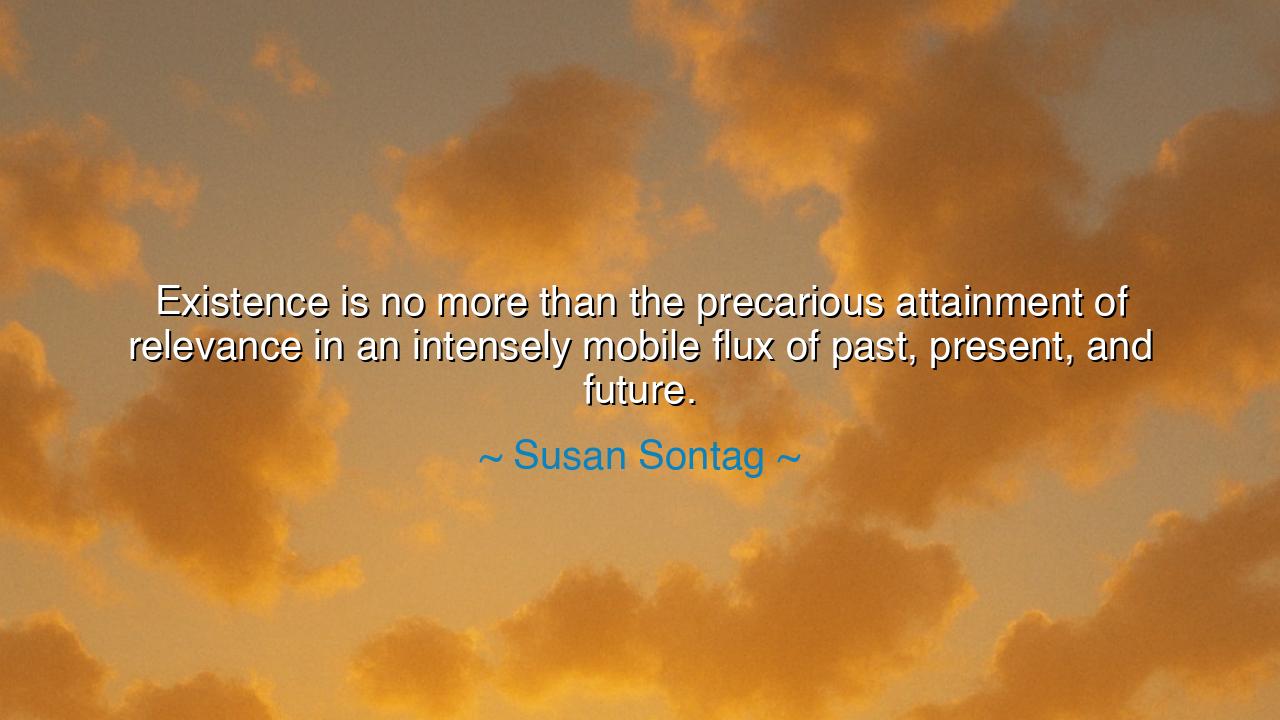
Existence is no more than the precarious attainment of relevance
Existence is no more than the precarious attainment of relevance in an intensely mobile flux of past, present, and future.






On the Fragility of Meaning and the Dance of Time
When Susan Sontag wrote, “Existence is no more than the precarious attainment of relevance in an intensely mobile flux of past, present, and future,” she offered not a cold philosophical statement, but a meditation on the human condition — a truth whispered from the edge of eternity. In these words, she reminds us that life is not a fixed state, but a delicate act of balance — a flame flickering amid the winds of time. To exist is not merely to breathe or to move, but to seek meaning — to struggle, however briefly, against the vast and shifting current that carries us from birth to death.
Sontag’s phrase “precarious attainment of relevance” reveals the vulnerability at the heart of being. She understood that each of us is a transient figure in an ever-moving tapestry of history, caught between what has been and what is yet to come. Our relevance — our sense of purpose and recognition — is not a gift, but a fragile creation we must forge anew each day. The ancients knew this truth well. They built monuments, carved epics, and wrote laws not merely to govern, but to endure — to fix themselves within the flow of time. Yet even stone erodes, and even memory fades. Sontag calls us, therefore, to humility: to see that relevance is not permanence, but participation — a brief harmony struck between the soul and the moment it inhabits.
The “intensely mobile flux of past, present, and future” is the river through which we all must move. The past clings to us in memory; the future calls us in hope; the present, slippery and fleeting, is where both forces meet. To live fully is to navigate this flux with awareness — to honor the past without becoming its prisoner, to dream of the future without being lost in illusion, and to root oneself in the present while it lasts. Sontag’s words are both warning and invitation: warning us that relevance cannot be found by standing still, and inviting us to dance with time, to shape meaning in motion rather than in stasis.
Consider the life of Vincent van Gogh, whose art was scorned in his lifetime, yet now burns eternally in the world’s collective heart. In his years of struggle, van Gogh lived the precariousness of existence — creating beauty amid poverty, pain, and madness. His work found no relevance in the eyes of his contemporaries, yet in the flux of time, its light grew brighter. His story reminds us that relevance is not fixed in the present; it flows, expands, and transforms across ages. To live meaningfully, therefore, is not to chase recognition, but to create with truth and courage, trusting that the river of time will carry your work where it must.
Sontag’s insight also challenges our modern obsession with visibility — the desperate quest to be seen, to be heard, to matter. In every age, humanity has feared irrelevance; but in ours, that fear has become a fever. We measure our worth in fleeting impressions, mistaking attention for meaning. Yet Sontag’s wisdom cuts deeper: relevance is not found in the applause of others, but in the authenticity of one’s engagement with life itself. The soul that gives wholly — to love, to art, to thought, to compassion — achieves a form of relevance that outlives fame. It becomes part of the eternal motion of existence, resonating through the unseen threads that connect all moments of time.
And yet, her tone is not despairing but exalting. The fact that existence is precarious does not make it meaningless;






AAdministratorAdministrator
Welcome, honored guests. Please leave a comment, we will respond soon